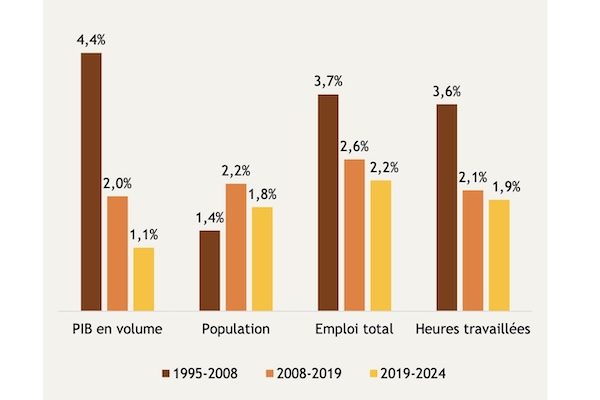 Average annual growth rates calculated by Statec and the IDEA Foundation;
Average annual growth rates calculated by Statec and the IDEA Foundation;
Fondation IDEA Asbl has published its 2025 Annual Review, entitled “Déboussolés” (Disoriented), comprising an in-depth analysis of the Luxembourg and international economic situation, coupled with a reflection on the structural uncertainties that marked the beginning of the year.
The foundation stated that, faced with an accumulation of successive crises and the emergence of new global challenges, the annual review offered a cross-sectional analysis of the main economic and social issues of the moment. The foundation added that in this uncertain global environment, the Luxembourg economy is gradually recovering after a period of turbulence, returning to growth (+1%), but the shock caused by the war in Ukraine continues to weigh on economic activity, adding that the country has been more severely affected by the tensions following the outbreak of the war in Ukraine than by those related to the COVID-19 pandemic. The Luxembourg economy is expected to return to growth in 2024 (+1%), but will remain flat for three years (based on provisional data). Construction, trade and financial activities are expected to decline for 2024. The foundation stated that sectors where value added has increased include energy, transport, hospitality, business services, industry and non-profit sectors (healthcare, education, public administration - see image. The trade war could disrupt the fragile recovery.
The foundation added that, despite a historic slowdown in employment, the value added created per employed person continued to decline, while dependence on cross-border workers remains as high as ever.
Compared to 2019, GDP per capita fell by 3.4%, GDP per job by 5.5%, and GDP per hour worked by 4%. The deficit is expected to decline to 0.4% of GDP in 2028.
The foundation cited four labour market challenges to consider, namely skills mismatch, dependence of cross-border workers, difficulties keeping seniors active and a decrease in the volume of hours worked per job.
The 2025 Annual Opinion also analysed the dynamics of the post-pandemic job market and examined the evolution of public finances under pressure, in the face of the new challenges of demographic ageing, the green transition and new defence requirements, as well as the evolution of the country's climate and energy transition.
The document also incorporated the results of the IDEA Economic Consensus, a consultation conducted with nearly 115 economic decision-makers, politicians and social partners in Luxembourg. The survey offered a unique insight into their perceptions of the current economic situation and future priorities, both at the national and European levels.
The review also paid attention to climate issues, with five substantive contributions covering:
- certain challenges of the transition to a low-carbon economy in Luxembourg;
- cooperation agreements and statistical transfers used to meet European renewable energy targets;
- the emergence of jobs related to environmental goods and services, an area in which Luxembourg excels at the European level;
- a perspective on the Greater Region's climate ambitions;
- the total cost of ownership of an electric vehicle compared to that of a combustion engine vehicle, beyond the simple purchase price.
The foundation added: “Recovery through taxation will only succeed in restoring long-term competitiveness if it is combined with ambitious policies to position the country for the major changes that are looming. In the short and medium term, the aim will be to make the most of new defence constraints, to position the country intelligently in technological transformations serving a ‘multi-specialisation’ of the economy capable of boosting productivity (AI, blockchain, greentech, new space, cybersecurity, etc.), and to propose a vision for a social model adapted to financial constraints, while avoiding the ‘blows’ dealt by a new and radically uncertain geopolitical context".








